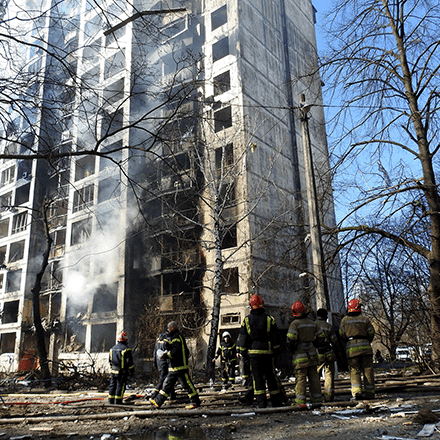The invasion of Ukraine goes beyond forcing businesses to stand by their corporate social responsibility (CSR) and environmental, social and corporate governance (ESG) strategies, it’s about choosing ethics above profit, in direct protest of Putin’s war.
What is business ethics?
According to the Institute of Business Ethics (IBE), business ethics is the application of ethical values to business behaviour which goes beyond a company’s legal requirements – it’s about making discretionary decisions guided by values. You could argue that an organisation’s values are what determines their CSR and ESG policies, providing a framework for the company’s culture and decision-making.
The companies that are pulling out of Russia are not doing so because of legal requirements or as an ESG or CSR tick box exercise but doing what they think is ethically right for their business and its stakeholders.
Which businesses have pulled out of Russia?
Payment giants Visa, Mastercard, and PayPal have ceased operating in the Russian market. Fashion retailer H&M has suspended sales and food and drink companies such as McDonald’s, Coca-Cola, Starbucks, and Heineken have halted business.
Supermarkets in the UK such as Sainsbury’s and Morrisons have removed Russian products from their shelves. And all the big four accounting companies – Deloitte, KPMG, EY, and PwC – have said they will no longer have a member firm in Russia.
Every day, more organisations are following suit and can no longer ignore the growing demand to cut ties with Russia.
What will happen to those who don’t?
Companies who have not yet cut ties with Russia are facing a backlash which could include damage to their reputations and even potential boycotts from customers, investors, and other stakeholders. This growing pressure is indicative of how strong people’s attitudes are to companies’ ethical practices.
Some organisations may be grappling with a complex mix of considerations when looking to cut ties, such as the harm to the livelihoods of their Russian employees or being restricted by complex franchise deals. However, business leaders who fail to act soon may find themselves unable to defend their actions.
How should companies respond to global politics and humanitarian issues?
The response to the war has sparked an interesting question – what is the role of business in society and how should companies respond to global politics and humanitarian issues?
This is the first time since World War Two that western countries have really had to step up on a global scale because of conflict. Most experts say that businesses cannot, and should not, hide behind a defence that ‘business is business’ – organisations are deeply embedded into our societies and have a social and ethical responsibility to act.
While thousands of people are donating funds, clothes, and medical supplies to humanitarian appeals, there is little that the public can do to stop the war. Many people look to business leaders and those in positions of power to take the lead in a way that individual people cannot. In addition to the government’s sanctions, businesses have the power to erode support for Putin even further through business boycotts – and most believe they have a moral duty to act.
Why is business ethics so important?
What the public think of a business is critical to its success, but when it comes to the invasion of Ukraine, we need to look beyond CSR and consider a company’s ethical principles.
Employees want to feel proud of their employer and be part of a company which does the right thing, and people want to buy from companies who are socially responsible. People are more selective than ever about the companies they choose to engage with - research by Morning Consult found that 37% of people polled had stopped buying from a brand they consider to be unethical – and this was before the invasion of Ukraine.
The public have a long memory, and those companies that take too long, or fail to act, may face long-term reputational damage, and even deeper than that, could be seen as contributing to the war and making profits from the proceeds of war crimes.
Businesses are facing the ultimate test in corporate social responsibility and most leaders agree that they have an ethical responsibility to cut ties with Russia and prove to their customers that their moral principles are not just lip service. Now is the time for leaders to really walk the walk and show the world that they are not just claiming to be socially ethical but are willing to put concrete steps in place to stand by their beliefs.

